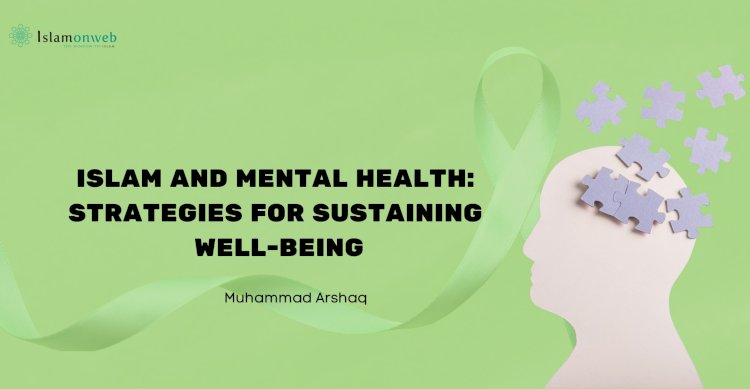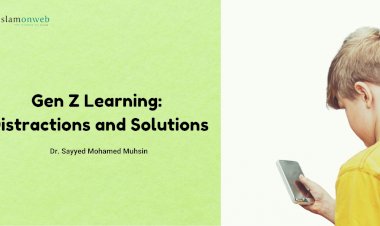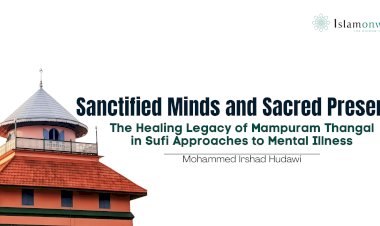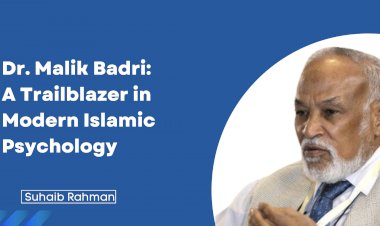Islam and Mental Health: Strategies for Sustaining Well-Being
As we observe World Mental Health Day, it is essential to recognize the significant contributions of Islamic teachings to our understanding of mental health. While modern research in this field has gained momentum in recent centuries, the foundations for addressing mental well-being can be traced back to the time of the Prophet Muhammad (s). His compassionate responses to mental health issues highlight the importance of emotional resilience, the acknowledgment of psychological struggles, and the value of patience.
On one occasion, a black woman came to the Prophet (s) and said, 'I suffer from epilepsy and during fits my body is exposed, so make supplication to Allah for me'. He (s) replied: 'If you wish you endure it patiently and you be rewarded with Jannah, or if you wish, I shall make supplication to Allah to cure you?' She said, 'I shall endure it'. (Riyad as-Salihin 35).
Not only did the Prophet acknowledge her mental health condition, but he also offered a prophetic remedy—patience—which today is echoed in therapeutic practices such as "sabr therapy" used by many psychologists. This illustrates the profound wisdom of Islamic teachings in addressing mental health long before modern interventions were developed.
Mental health, as defined by the World Health Organization (WHO), is a state of well-being in which an individual realizes their abilities, can manage the normal stresses of life, works productively, and contributes to their community. Notably, mental health is not defined as constantly having positive experiences or being happy all the time, because life is inherently a blend of both good and challenging experiences
Unfortunately the human brain likes to or constantly tends to believe that “if Allah loves me, all the things in my life will be perfect”. But the reality is exact opposite:
The Messenger of Allah (ﷺ) said: من يرد الله به خيراً يصب منه"He whom Allah intends good, He makes him to suffer from some affliction" (Riyad as-Salihin 39). In the context of mental health, this saying can be understood as a reminder that difficulties such as anxiety, depression, or other emotional struggles are part of the human experience, and enduring them with patience can bring spiritual reward and a closer connection to Allah. Mental health challenges are seen not as a punishment but as a test or trial, through which a believer can cultivate resilience, faith, and deeper understanding of their inner strength.
When Allah sends us difficulties, He remains true to His promise: لَا يُكَلِّفُ اللَّهُ نَفْسًا إِلَّا وُسْعَهَا "Allah does not burden a soul beyond what it can bear" (Quran 2:286). This assurance reminds us that no matter how overwhelming our mental or emotional struggles may seem—whether it's anxiety, depression, or grief—these challenges are within our capacity to endure. The greater the mental health challenge, the more it highlights the strength and resilience we possess, even when we may not initially recognize it.
So far, we have established here that those who are righteous often face greater sufferings from Allah. The Prophet Muhammad (s) said, "The most tested people are the prophets, then those who are closest to them, and then those who are next in faith. A person is tested according to their level of faith." (Ahmad and At-Tirmidhi). However, does this imply that these individuals possess the worst mental health? Definitely, not. Because, they view their sufferings as blessings and opportunities to draw closer to Allah and attain greater rewards in the Hereafter.
Consider the analogy of a skilled athlete training for a competition. The athlete endures rigorous workouts, pushing their limits and facing pain along the way. While others may view this struggle as suffering, the athlete understands that these challenges are essential for their growth and success. In the same way, the righteous see their afflictions not as signs of unhappiness, but as blessings that enhance their spiritual strength. This perspective allows them to find joy and fulfillment even in the face of adversity, reinforcing the idea that true happiness is not the absence of suffering, but the ability to find meaning and purpose within it.
When discussing mental health, some common words that come to mind are happiness, sadness, grief, depression, and anxiety. These emotions are not modern concepts; they have been part of the human experience for centuries. The life of the Prophet Muhammad (s) provides profound lessons on how to deal with these emotions in a spiritually meaningful way. His life was marked by moments of great joy and deep sorrow, showing us that experiencing a wide range of emotions is part of being human.
One notable example is the period in the Prophet’s life known as the "Year of Sadness." During this time, he faced tremendous personal loss, including the deaths of his beloved wife Khadija, his supportive uncle Abu Talib, and his son Ibrahim. These losses had a deep emotional impact on him. This highlights that even the most spiritually elevated individuals, like the Prophet, experienced sorrow and emotional hardship. The lessons from his life remind us that it is not the absence of emotional pain that defines mental health, but how we manage and cope with these challenges, drawing strength from faith and resilience.
The Prophet Muhammad (s) had started shedding tears when he lost his son, Ibrahim. Then, Abdur Rahman bin `Auf said, "O Allah's messenger, even you are weeping!" He said "Indeed, the eyes shed tears and the heart feels sorrow. Yet, we do not say anything except that which is pleasing to our Lord. Your departure, O Ibrahim, surely leaves us all deeply saddened." (Sahih al-Bukhari 1303) This response reflects a profound understanding of grief and mental health within an Islamic framework.
The Prophet's reaction illustrates that experiencing sorrow and expressing emotions are natural and healthy responses to loss. His acknowledgment of tears and heartache demonstrates the importance of allowing oneself to feel and process emotions rather than suppressing them. This aligns with contemporary mental health practices that emphasize the necessity of emotional expression as a means of coping with grief.
While he openly mourned the loss of his son, he also emphasized the importance of maintaining faith and submitting to Allah's will. This duality of feeling sadness while simultaneously finding comfort in faith serves as a powerful model for handling difficult situations in a healthy manner. This approach encourages individuals to embrace their feelings, seek support when needed, and rely on their faith to navigate the complexities of mental health challenges.
One of the common misconceptions among many Muslims is the belief that mental health issues stem solely from a lack of spiritual faith. This view is fundamentally incorrect.
Allah says in Quran: وَلَنَبْلُوَنَّكُم بِشَيْءٍ مِّنَ الْخَوْفِ وَالْجُوعِ وَنَقْصٍ مِّنَ الْأَمْوَالِ وَالْأَنفُسِ وَالثَّمَرَاتِ ۗ وَبَشِّرِ الصَّابِرِينَ And We will surely test you with something of fear and hunger and a loss of wealth and lives and fruits, but give good tidings to the patient (Quran 2:155). This passage reminds us that hardships are not indicators of weak faith, rather a natural part of life and tests from Allah.
Rania Awaad, a leading Muslim professional in the field of psychology, addresses this misunderstanding by explaining: "Mental health issues are multifactorial. They can arise from several different sources: biological or genetic, environmental, and spiritual. When people say, 'You are depressed because you have a weakness of faith,' this is inaccurate. Spirituality and faith can be part of the story, but it isn’t the only explanation"
This clarification highlights the complexity of mental health, emphasizing that it cannot be reduced to a single cause, such as a deficiency in spiritual faith. Instead, mental health challenges often result from a combination of factors that need to be addressed holistically.
In today’s society, many Muslims may feel ashamed to openly discuss their struggles with depression, often hesitating to seek help from a counselor or mental health professional. However, this attitude is not in line with Islamic teachings. Islam emphasizes the importance of mental health just as much as physical health. The Prophet Muhammad (peace be upon him) said: تَدَاوَوْا عِبَادَ اللَّهِ فَإِنَّ اللَّهَ سُبْحَانَهُ لَمْ يَضَعْ دَاءً إِلاَّ وَضَعَ مَعَهُ شِفَاءً
"Seek treatment, O slaves of Allah! For Allah does not create any disease but He also creates with it the cure." (Sunan Ibn Majah 3436). This hadith highlights that there is a remedy for every ailment, including anxiety and depression and seeking treatment is encouraged.
Moreover, Allah encourages us to seek knowledge and guidance, as stated in the Quran: "So ask the People of Knowledge if you do not know" (Quran 16:43). This verse underscores the importance of consulting those who are knowledgeable, including psychologists and counselors, when we are struggling with mental health issues. Seeking help is not only permissible in Islam; it is a proactive step towards healing and well-being.
About the author
Muhammad Arshaq PG research scholar, Darul Huda Islamic University, Chemmad. Undergraduate in psychology. (arshaqkondotty@gmail.com)
REFERENCES
Hadees: Riyad as-Salihin, Ahmad and At-Tirmidhi, Sahih al-Bukhari, Sunan Ibn Majah
Umarji, O. (2022). Faith in mind: Islam’s role in mental health. Yaqeen Institute for Islamic Research.
Haque, A., & Kamil, N. (2011). Islam, Muslims, and mental health. In Counseling Muslims.
Awaad, R., Elsayed, D., & Helal, H. (2021). Holistic healing: Islam’s legacy of mental health. Yaqeen Institute for Islamic Research.
Baasher, T. A. (2001). Islam and mental health. Eastern Mediterranean Health Journal (EMHJ).
Esmail, A. (1996). Islamic communities and mental health. In Psychiatry and Religion.
Disclaimer
The views expressed in this article are the author’s own and do not necessarily mirror Islamonweb’s editorial stance.
























Leave A Comment